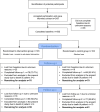Web-Based Psychoeducational Intervention to Improve Family Caregiver Preparedness in Specialized Palliative Home Care: A Randomized Controlled Trial
- PMID: 40485035
- PMCID: PMC12146470
- DOI: 10.1002/pon.70202
Web-Based Psychoeducational Intervention to Improve Family Caregiver Preparedness in Specialized Palliative Home Care: A Randomized Controlled Trial
Abstract
Objective: Preparedness for caregiving refers to how ready family caregivers perceive themselves for caregiving tasks and stress of the caregiving role. This study investigated whether a web-based psychoeducational intervention could improve preparedness for caregiving among family caregivers of patients receiving specialized palliative home care.
Methods: The intervention "narstaende.se" was provided via a website featuring 23 short videos in which healthcare professionals and family caregivers (actors) discussed key care-related issues. Family caregivers were randomized to the intervention or control group and completed the Preparedness for Caregiving Scale (PCS) at baseline, 4 weeks, and 8 weeks. Data were analyzed using linear mixed models. The intervention effect was assessed based on PCS scores of the entire sample, followed by subgroup analyses based on level of baseline preparedness for caregiving, participation in physical care, and active intervention use, as determined by responses to single-item questions.
Results: A total of 205 family caregivers were recruited (103 intervention, 102 control). The intervention had no significant effect on preparedness for caregiving, including in subgroups based on level of baseline preparedness for caregiving, participation in physical care, or active intervention use. However, all subgroups reported higher levels of preparedness for caregiving at both follow-up assessments than at baseline.
Conclusions: Preparedness for caregiving improved over time in both the intervention and control groups, suggesting other contributing factors. Limited participant engagement may explain the lack of intervention effect. Future studies should evaluate the intervention with more structured and clinically integrated use.
Keywords: cancer; family caregivers; oncology; palliative care; support; web‐based intervention.
© 2025 The Author(s). Psycho‐Oncology published by John Wiley & Sons Ltd.
Conflict of interest statement
The authors declare no conflicts of interest.
Figures
References
Publication types
MeSH terms
Grants and funding
LinkOut - more resources
Full Text Sources
Medical




